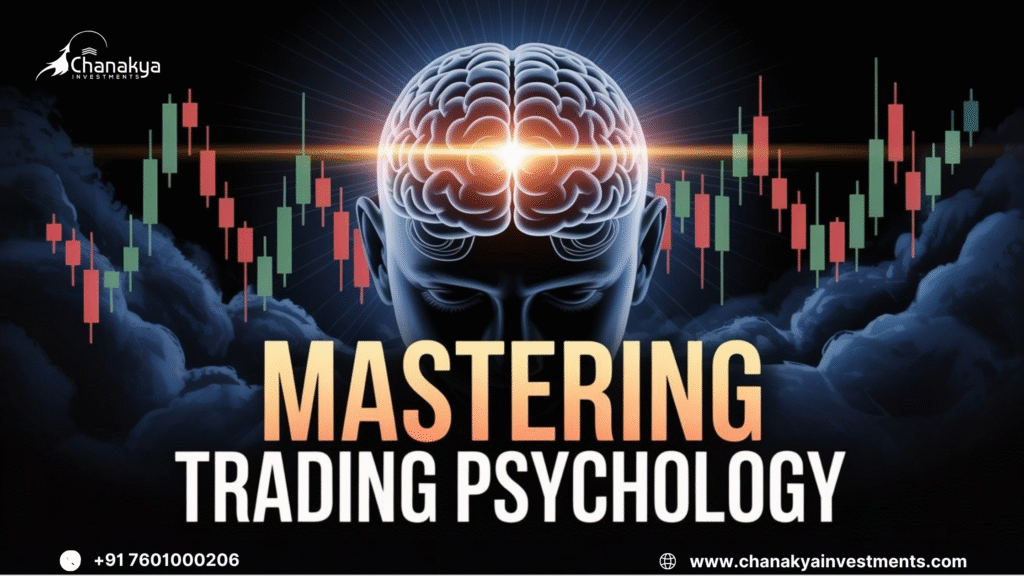
To most people, traders who trade successfully are associated with complicated algorithms, powerful trading platforms, or insider knowledge. Although some of these things might be a factor, it is probably not the least commonly accepted secret weapon that consistently profitable traders wield—Trading Psychology.
Mastering one’s mind is more important than mastering any chart pattern or indicator. In actuality, it is the ability to control emotions and maintain mental discipline with every single decision which separates the winners from the losers in the long-term view.
In this blog, we will discover how emotions like fear, greed, overconfidence, and doubt hinder traders and how they can work on conditioning the mind to trade professionally.
What Is Mastering Trading Psychology?
Trading psychology is the set of emotions and mental states that influence the decisions made by a trader. It consists of fear, greed, hope, overconfidence, discipline, patience, and regret. Unlike technical analysis or fundamental analysis, trading psychology deals with how you react to market behavior rather than with what the market actually does.
It affects heavily when and how you:
- Enter trades
- Hold positions
- Exit trades
- Avoid unnecessary risks
Two big emotions in trading are:
- Fear: It fears the trader into exiting a trade prematurely or into hesitating to enter, thus missing out on opportunities.
- Greed: It pushes the trader to chase profit, overtrade, or hold onto losses for too long.
Understanding these emotions—and how to control them—is key to becoming a successful trader.
Top 7 Psychological Mistakes Traders Make
1️⃣ Fear of Losing
- Fear to enter valid trades or fearful to hold them for long enough.
- Solution: Accept losses as a part of the trade setup. Use risk management in such a way that it can always save you from disastrous losses.
2️⃣ Overtrading
- From revenge trading or screen addiction.
- Solution: Trade within a certain number limit for each session. Trade for quality, not quantity.
3️⃣ Lack of Discipline
- Ignoring stop losses, targets, or any rule-based systems.
- Solution: Take a checklist with you for every trade to help maintain discipline.
4️⃣Chasing the Market (FOMO)
- Late entries due to fear of missing out.
- Solution: Trust your strategy, wait for setups, and enter with confirmation.
5️⃣ Greed
- Holding positions for longer in hopes of more profit.
- Solution: Use a set risk-reward ratio and exit accordingly.
6️⃣Ignoring Mental Health
- Stress, anxiety, or too much screen time harms clarity.
- Solution: Take breaks, run, meditate, and get a good night’s sleep.
7️⃣Lack of Self-Awareness
- Repeatedly committing the same errors and never contemplating modus operandi.
- Solution: Maintain a trading journal and review it every week to identify trading patterns.
5 Ways to Build a Winning Trading Mindset
✅ 1. Create Your Trading Plan
Outline your:
- Entry and exit criteria
- Capital at risk per trade
- Trading schedule
- Position-sizing strategy
If you have a clear plan, emotional decisions won’t interfere.
✅ 2. Record Every Trade
Track:
- Reasons for entering the trade
- State of emotion before/after
- Mistakes and lessons learned
This approach achieves more self-awareness and faster learning.
✅ 3. Visualization & Affirmations
Now, use positive self-talk to reprogram your trading mindset:
- “I follow my plan.”
- “Losses are part of trading.”
- “I stay calm and confident.”
✅ 4. Simulate High-Stress Scenarios
Use stressful demos like extremely fast markets or drawdowns to condition your emotional responses so that you don’t crumble under pressure.
✅5. Join a Trading Community
Being part of a like-minded tribe like The Safe Trader Academy offers:
- Emotional support
- Accountability
- Regular mindset check-ins
Why Most Traders Fail: It’s Not the Strategy, It’s the Psychology
The stock market is full of traders who know what to do but fail to do that at the right moment.
Why should that be?
Because psychology gets in the way. Fear wins over logic. Greed drowns out the voice of caution. Doubt makes that person hesitate to act. A dangerously inflated ego will just push the limit beyond what should have been.
A trader’s worst enemy isn’t the market — it’s often themselves.
The Role of Subconscious Beliefs in Trading
Your beliefs about money, success, and failure impact your trading performance far more than you realize.
If you subconsciously believe:
- “I don’t deserve to make money easily,”
- “Making profit is always hard,”
- “I always mess up when it matters most,”
…you will sabotage your own trades, no matter how good your setup or system is.
Real Success Comes from Emotional Control
A trader with an average strategy but strong psychology will consistently outperform a trader with a brilliant strategy and a weak mindset.
Controlling emotions isn’t optional—it’s the key to consistency and long-term profits.
Why Most Traders Fail — And How You Can Avoid It
Let’s be honest — 95% of traders lose money.
But it’s not because they didn’t learn candlestick patterns. It’s because they:
- Overreact emotionally
- Trade without discipline
- Ignore mindset development
The 5% who succeed?
They treat trading like a mental sport — where emotions are trained, not ignored.
Conclusion: Mind Over Markets
Mastering Trading Psychology is not a one-time achievement—it’s an ongoing process of self-awareness and discipline. The best traders treat their mindset like a muscle: they train it daily, evaluate it regularly, and protect it fiercely.
Remember, the market doesn’t control your success—you do.
And the real edge is not in the market, but in how you think, feel, and act within it.
If you Want To Know More ,Please Click Here
